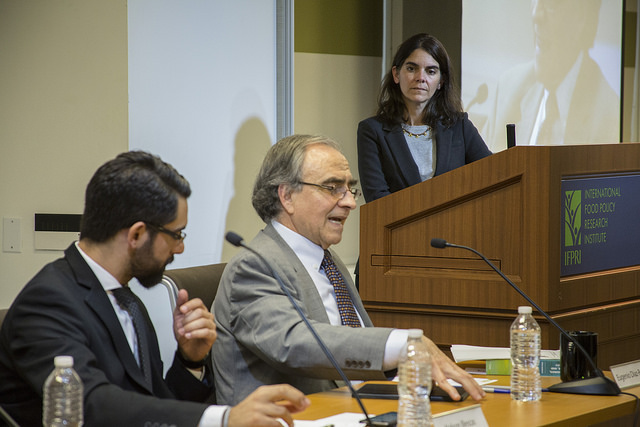In December, Argentina will host the Eleventh World Trade Organization (WTO) Ministerial Conference (MC11) in Buenos Aires. How will the global trading system’s top decision-making forum affect efforts to alleviate hunger and malnutrition? Participants at a recent IFPRI seminar, “Global food security and the WTO: The role of Mercosur countries,” examined that question for Latin America, finding a lot of uncertainty.
There are many issues related to agriculture worth addressing at MC11, said IFPRI Research Coordinator Valeria Piñeiro, including a shifting balance of supply and demand; developing countries’ trade-distorting agricultural subsidies; increased price volatility; rising use of agricultural commodities in biofuels; and climate change.
This economic landscape poses many problems for food security. “World trade of agricultural products is seriously limited by policies that are inconsistent with global food security purposes,” said Agustín Tejeda Rodriguez, Chief Economist at the Buenos Aires Grain Exchange. Mercosur—the common market whose principal members are Argentina, Brazil, Paraguay, Uruguay, and Venezuela (currently suspended)—will likely be exporting more food to emerging countries struggling with agricultural production, he said. So a major objective of MC11 should be creating and encouraging a more open world food trading system.
Mercosur should play a key role in this effort, said Eugenio Diaz-Bonilla, head of IFPRI’s Latin America and Caribbean Program. Mercosur countries are the largest net exporting region of the world, he noted, explaining that the Latin American region provides two functions in the global trading system: Buttressing food security and stability of prices and trade volumes; and supporting global environmental sustainability.
Nelson Illescas, head of the Institute for International Agricultural Negotiations (Fundación INAI), echoed the sentiment of some members of the Argentine delegation at the Oslo trade ministers meeting who said that it would be impossible for trade ministers to depart Buenos Aires without some new agreement on agriculture. They should start by addressing domestic support, he said.
For instance, there are several domestic support measures currently protected under WTO rules that distort trade, Diaz-Bonilla said. “What is legal,” he said, “may not make economic sense.”
“The world needs trade!” said Marcos Sawaya Jank, Vice President of Corporate Affairs and Business Development for BRF Asia-Pacific and an IFPRI Board Member. But he admitted that he is not optimistic that MC11 will produce anything substantive. “In today’s world, one cannot believe that the WTO will be the solution,” he said. Instead, he said that Argentina, Brazil, and other exporting countries must partner on trade policy because countries like China and India are very resistant to global trade reforms due to growing domestic subsidies and problems of market excess.
Multilateral agreements are necessary to maximize market access, said Ligia Dutra Silva, head of the International Office of the Brazilian Confederation of Agriculture and Livestock (CNA). For that reason, supporting MC11 is critical as it is the best forum to negotiate a deal that will benefit developing countries as a whole. Moreover, those countries must reform their food-related subsidies to compete in the global marketplace. “If you subsidize food for starving people, fine, but subsidizing food that is made available for the international market is unfair,” Silva said. MC11 goals must include cuts in agricultural subsidies, more transparency, and compliance with WTO notification requirements—because, failing that, she asked, “how can we negotiate something when we don’t know how much we are talking about”?
Katarlah Taylor is an Information and Knowledge Management Facilitator at IFPRI.







